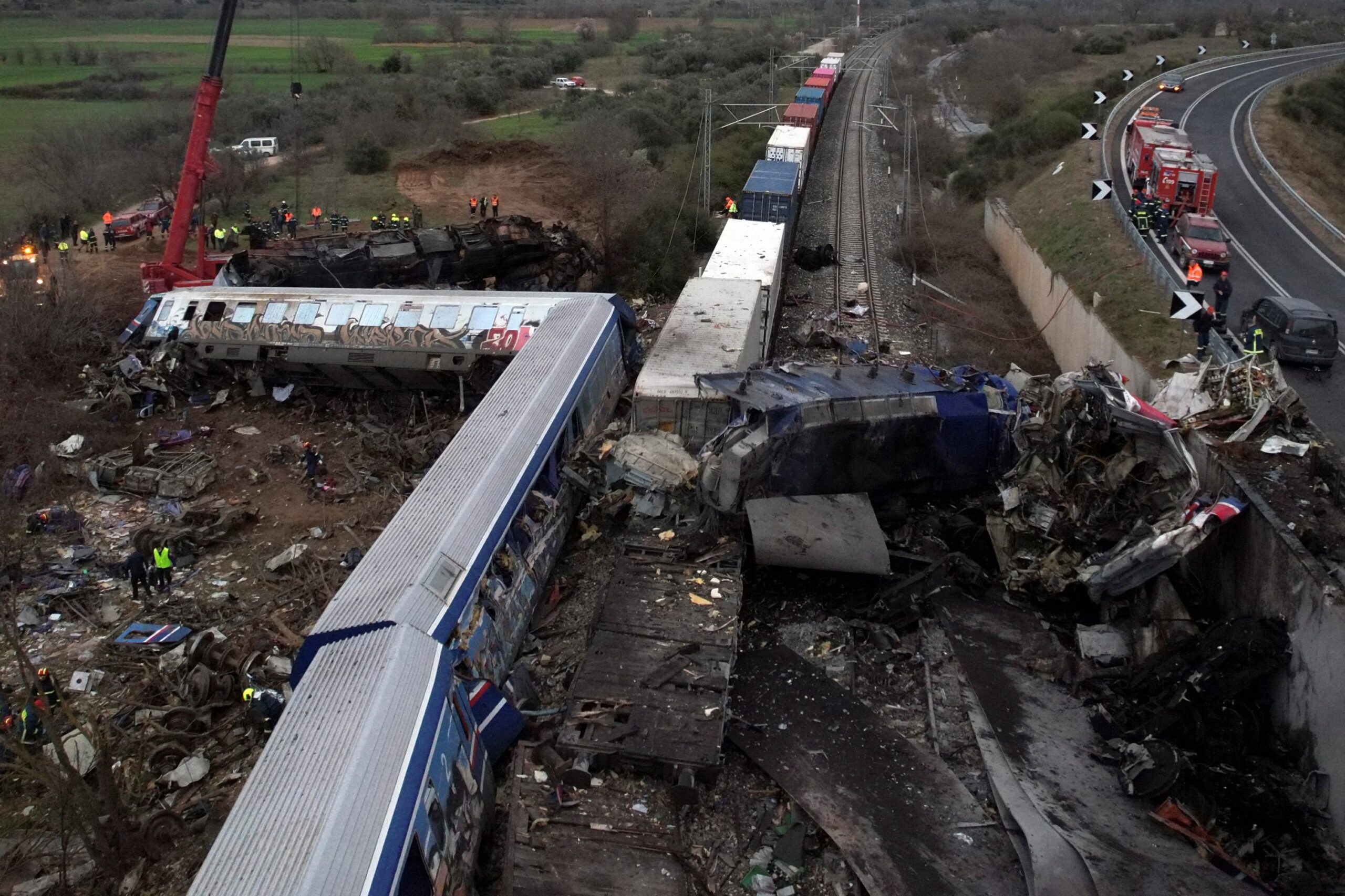International
Greece: no-confidence motion against the government. It allegedly falsified and concealed evidence of a train crash

In Greece, the government is facing a motion of censure and public doubts about its handling of the investigation into the train accident that killed 57 people last year in Tempé.
Over the past few days, there has been an increasing number of grey areas surrounding the Greek authorities’ handling of the investigation into the Tempé train disaster, which, in February 2023, claimed the lives of 57 passengers.
On Thursday, March 28, the conservative right-wing government (New Democracy, ND), led by Prime Minister Kyriakos Mitsotakis, is even facing a motion of censure tabled on Tuesday in the Vouli, the Greek Parliament, by Nikos Androulakis, leader of the Social Democrat group (Pasok).
The Tempe train accident case takes a new turn after new information was made public by “Vima tis Kyriaki.” The newspaper’s documents show that the Larissa stationmaster’s dialogues with the driver of the fatal train were tampered with, while, according to the publication, the conversations were illegally and prematurely deleted from the railroad’s communications recording system.
As per documents from the EL.AS Forensic Laboratories, published by the newspaper, the stationmaster’s hypothesis for the train’s departure, as presented on March 1 in an audio document, did not refer to the fatal train but to a local train that was proceeding normally.
On February 28, 2023, just after 11 p.m., two trains collided at Tempé, near Larissa in central Greece. One was Intercity 62, arriving from Athens and bound for Thessaloniki; the other was an oncoming freight train. A few hours after the accident, the explanation was found: it was human error; the stationmaster had given the wrong indication. The government promises a serious investigation, but it is slow to come. Ok, there is the guilty responsibility; everything else is fine, and the Greek train network is discharged, but now things seem different.
Since the weekend, public opinion in Greece has been in turmoil. According to the weekly To Vima, the recordings of the conversation between the Larissa station manager and the driver of one of the trains are in fact a montage of different sounds. The aim of the montage is to lend credence to the theory of human error and establish the stationmaster’s responsibility.
While the government cries “fake news,” the families of the victims are not surprised by these revelations. Right from the start of the investigation, the families of the victims wanted answers, but they weren’t getting them. On the contrary, evidence was concealed. A few days after the accident, the ground was cleaned. Why? Why were the wagon carcasses moved to Koulouri, a village near Tempé, with no access at first?
These questions remain unanswered. However, according to the independent investigation carried out by experts commissioned by the families, traces of xylene, toluene, benzene and propane were found on the residues of rubble and rails, but according to sources, the freight train that collided with the passenger train had not received prior authorization to transport these highly flammable materials. This would create responsibility for the transport minister at many different levels.
In reality, the families of the victims have a feeling of impunity on the part of politicians. Victims’ families and the public feel a lack of deep democracy and transparency. Not only that, they cede an ever-present and unassailable class of politicians and senior bureaucrats, never resposnable to their own mistakes, even when they lead to huge disasters with many deaths.
On March 15, the chief European prosecutor, Laura Kövesi, deplored the authorities’ lack of cooperation on Greek television. Moreover, under Greek law, it is impossible to prosecute the then Transport Minister Kostas Karamanlis, like his predecessor, without lifting their parliamentary immunity, which ND MPs refuse to vote for.
Since 2010, Greece, on the brink of default, has been in a hurry to privatize rail transport to repay its creditors. The way was paved as early as 2004 with the splitting of the various activities of the national railway company, OSE, into three parts (OSE, GAIA OSE, and ErgOSE), which remained public, while four private companies were created, owning the trains for the lines. In charge of state reform between 2012 and 2015, Kyriakos Mitsotakis made privatization and the elimination of civil servant posts a leitmotiv. In 2017, after signing a third memorandum, the left-wing Syriza party was forced to complete the sale of transport activities and sell the TrainOSE railway company, which manages passenger and freight trains on OSE’s rails, to Italy’s Ferrovie dello Stato Italiane.
For years, unions have been warning about the state of the network, in particular signaling and safety problems. To no avail. What’s worse, a contract has become the talk of the town: the “717 contract.”. It concerns projects financed by the European Union and carried out by ErgOSE. Subpoenas were issued on the orders of the European Public Prosecutor in charge of investigating the use of EU funds. Three suspects who appeared in court paid bail: one for 700,000 euros, another for 600,000 euros, and the third for 500,000 euros. That’s 1.8 million euros. But for the moment, the rhetoric remains the same: control of public spending and privatization, even at passengers’ risk.
The responsibility for this accident and the deaths does not lie with the railroad stationmaster, but with those who have forced all of Europe into continuous austerity care and forced pre-privatization even in the public sectors. The Greeks are as much victims of the trains as of the European authorities and their own politicians.






